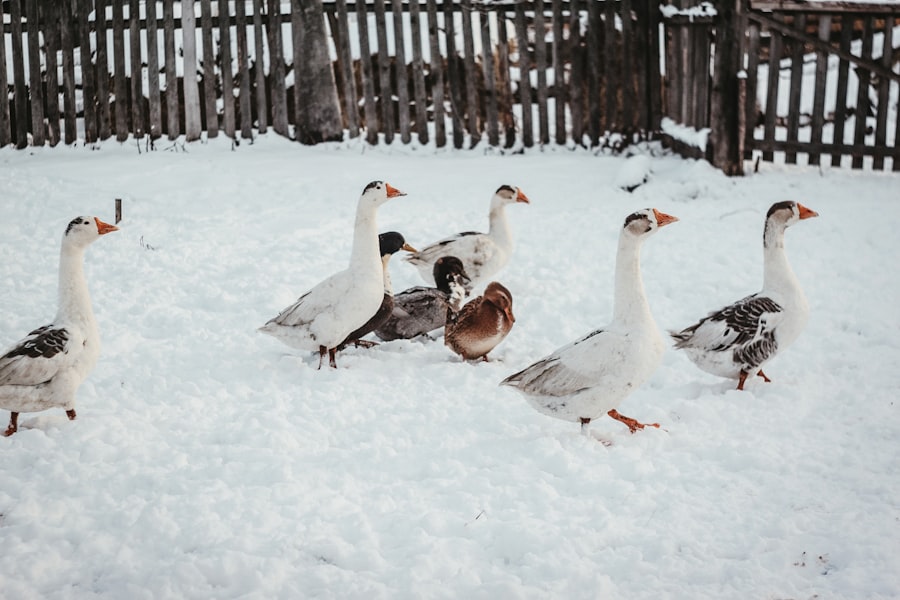Geese are a common sight in many areas, whether it be in parks, golf courses, or even residential neighborhoods. These birds are known for their distinctive honking sound, which can often be quite loud and disruptive. This noise pollution caused by geese can be a nuisance to both humans and other wildlife in the area. In this article, we will explore the behavior of geese, their vocalizations, and the factors that trigger their noisy behavior. We will also discuss the importance of keeping geese quiet and provide tips for reducing noise from geese.
Key Takeaways
- Geese can be a source of noise pollution, which can be disruptive to humans and other animals.
- Understanding geese behavior and vocalizations can help identify triggers for noisy behavior.
- Factors such as mating season, territorial disputes, and stress can cause geese to become noisy.
- Keeping geese quiet is important for maintaining a peaceful environment and avoiding conflicts with neighbors.
- Tips for reducing noise from geese include creating a comfortable environment, training geese to control their noise levels, using deterrents, and working with professional bird control services.
Understanding Geese Behavior and Vocalizations
Geese are social birds that live in flocks and have a complex system of communication. They use a variety of vocalizations to communicate with each other and establish their territory. One of the most well-known vocalizations of geese is their honking sound, which is used to communicate with other members of the flock and warn of potential threats.
In addition to honking, geese also use hissing sounds as a form of communication. Hissing is often used as a warning signal when geese feel threatened or when they are trying to establish dominance over other geese. These vocalizations are an important part of geese behavior and play a crucial role in their social interactions.
Factors That Trigger Noisy Geese
There are several factors that can cause geese to become noisy. One of the main triggers for noisy geese is the presence of perceived threats or predators. When geese feel threatened, they will often honk loudly to alert other members of the flock and deter potential predators.
Another factor that can trigger noisy geese is competition for resources such as food or nesting sites. Geese are territorial birds and will defend their territory from other geese. This can lead to aggressive behavior and increased vocalizations.
Lastly, environmental factors such as loud noises or disturbances can also cause geese to become noisy. For example, if there is construction work or other loud activities happening in the area, geese may become agitated and honk loudly in response.
The Importance of Keeping Geese Quiet
The noise pollution caused by geese can have negative effects on both the environment and the community. For one, excessive noise can disrupt the natural balance of an ecosystem. Loud honking from geese can scare away other wildlife and disrupt their feeding or breeding patterns. This can have a cascading effect on the entire ecosystem.
In addition, noisy geese can be a nuisance to humans living in the area. The constant honking can be disruptive and make it difficult to concentrate or enjoy outdoor activities. It can also lead to complaints from residents and create tension within the community.
Therefore, it is important to find ways to keep geese quiet in order to maintain a harmonious environment for both wildlife and humans.
Tips for Reducing Noise from Geese
There are several practical tips that can help reduce noise from geese. One effective strategy is to create physical barriers between geese and areas where their noise is unwanted. This can be done by installing fences or hedges around sensitive areas such as playgrounds or picnic areas.
Another tip is to discourage geese from congregating in certain areas by removing food sources or nesting sites. Geese are attracted to areas with abundant food and suitable nesting sites, so by removing these incentives, they may be less likely to stay in the area and cause noise disturbances.
Additionally, providing alternative habitats for geese can help reduce noise pollution. Creating designated areas for geese to feed and nest away from residential areas can help minimize their impact on human communities.
Creating a Comfortable Environment for Geese

Creating a comfortable environment for geese can also help reduce their noise levels. This can be done by providing suitable nesting sites and food sources in areas away from human activity. By providing these resources, geese are less likely to feel threatened or compete for resources, which can lead to noisy behavior.
Another way to create a comfortable environment for geese is to minimize disturbances in their habitat. This can be done by avoiding loud noises or sudden movements when geese are present. By being mindful of their presence and respecting their space, we can help create a more peaceful environment for both geese and humans.
Training Geese to Control Their Noise Levels
It is possible to train geese to control their noise levels through positive reinforcement techniques. By rewarding quiet behavior and ignoring or redirecting noisy behavior, geese can learn to associate quietness with positive outcomes such as treats or attention.
Training geese to be quieter can take time and patience, but with consistent effort, it is possible to achieve results. It is important to remember that geese are intelligent animals and can learn new behaviors with the right training methods.
Using Deterrents to Prevent Noisy Geese
There are several types of deterrents that can be used to prevent noisy geese. One common method is the use of visual deterrents such as scarecrows or reflective objects. These visual deterrents can help create a sense of danger for geese and discourage them from staying in the area.
Another effective deterrent is the use of sound devices that emit loud noises or predator calls. These devices can startle geese and make them feel unsafe, causing them to leave the area and reduce their noise levels.
It is important to note that deterrents should be used in a humane and ethical manner, without causing harm or distress to the geese.
Working with Professional Bird Control Services
In some cases, it may be necessary to seek the help of professional bird control services to address issues with noisy geese. These professionals have the knowledge and experience to effectively manage geese populations and reduce noise pollution.
When choosing a bird control service, it is important to look for a company that has experience working with geese and uses humane methods. They should also have a good understanding of local regulations and guidelines regarding bird control.
Summary of Key Strategies for Keeping Geese Quiet
In summary, keeping geese quiet is important for maintaining a harmonious environment for both wildlife and humans. Understanding geese behavior and vocalizations can help us identify the factors that trigger noisy behavior. By creating a comfortable environment for geese, providing alternative habitats, and using deterrents when necessary, we can help reduce noise pollution caused by geese.
Training geese to control their noise levels through positive reinforcement techniques can also be effective. In some cases, it may be necessary to seek the help of professional bird control services to address issues with noisy geese. By implementing these strategies, we can create a more peaceful and enjoyable environment for everyone.
If you’re interested in learning more about how to keep geese quiet, you might also find this article on Snaplock Chicken Coop helpful. It provides valuable insights into creating a peaceful and comfortable environment for your geese, which can contribute to reducing noise levels. Additionally, if you’re considering breeding geese, you may want to check out this informative piece on how many eggs geese lay. Understanding their reproductive patterns can help you better manage their behavior and minimize disturbances.
FAQs
What are some reasons why geese can be noisy?
Geese can be noisy for various reasons such as mating calls, territorial disputes, warning calls, and distress calls.
Is it possible to keep geese completely quiet?
No, it is not possible to keep geese completely quiet as it is a natural behavior for them to communicate with each other.
What are some methods to reduce geese noise?
Some methods to reduce geese noise include providing them with a comfortable and spacious living environment, keeping them well-fed and hydrated, and providing them with toys and activities to keep them occupied.
Can training geese help reduce their noise?
Yes, training geese can help reduce their noise by teaching them to respond to certain commands and cues.
Are there any legal restrictions on keeping geese?
Yes, there may be legal restrictions on keeping geese in certain areas. It is important to check with local authorities and obtain any necessary permits before keeping geese.
Meet Walter, the feathered-friend fanatic of Florida! Nestled in the sunshine state, Walter struts through life with his feathered companions, clucking his way to happiness. With a coop that’s fancier than a five-star hotel, he’s the Don Juan of the chicken world. When he’s not teaching his hens to do the cha-cha, you’ll find him in a heated debate with his prized rooster, Sir Clucks-a-Lot. Walter’s poultry passion is no yolk; he’s the sunny-side-up guy you never knew you needed in your flock of friends!







